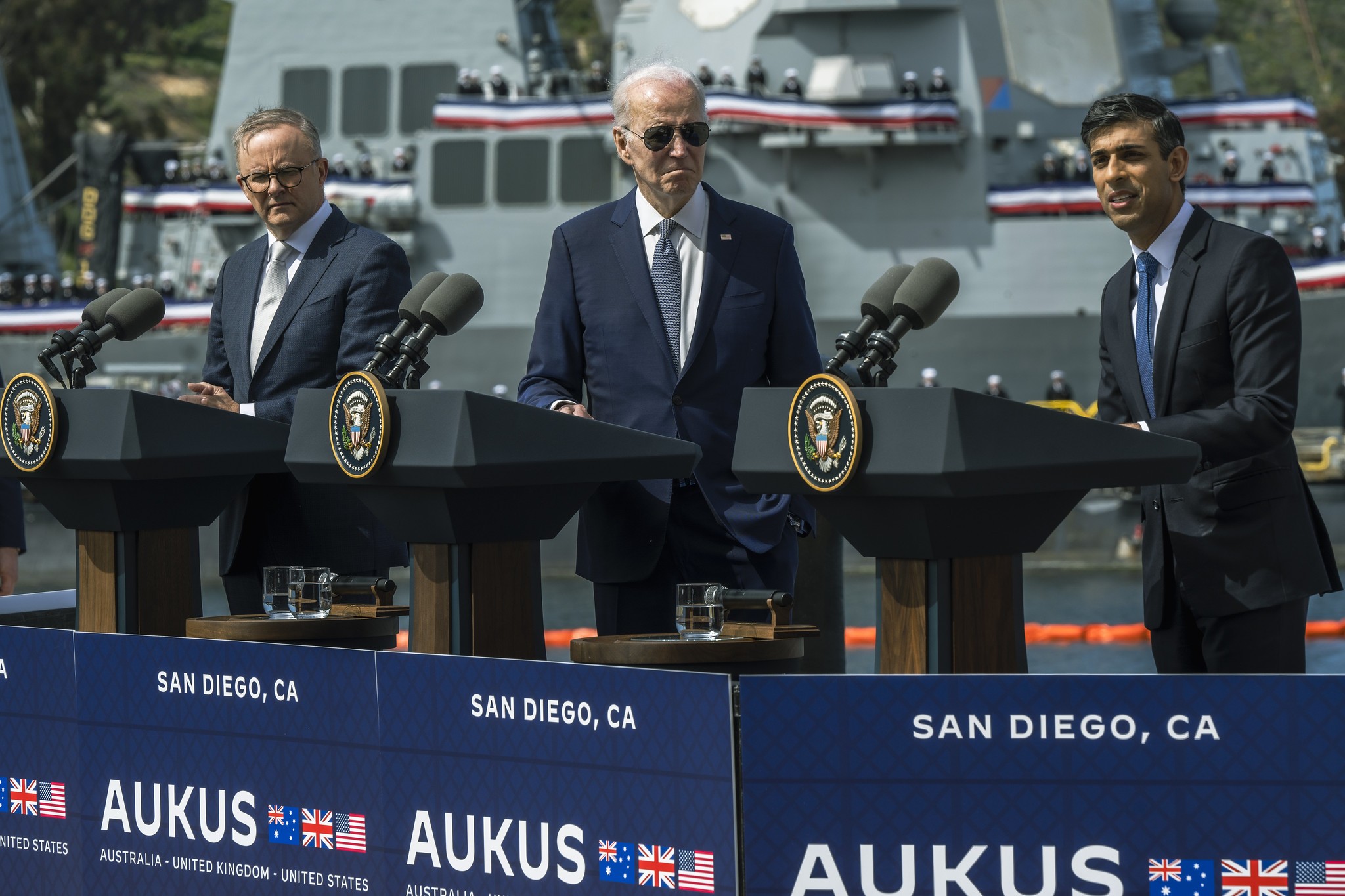News
Why AUKUS is here to stay, despite looming roadblocks

FILE: Secretary of Defense Lloyd J. Austin III greets British Prime Minister Rishi Surnak and Australian Primer Minister Anthony Albanese the AUKUS bilateral meeting San Diego, Calif, March 13, 2023. (DoD photo by Chad J. McNeeley via U.S. Secretary of Defense/Flickr, CC BY 2.0)
AUKUS is a defence agreement among Australia, the United Kingdom and the United States designed to deter Chinese power in the Indo-Pacific region.
The agreement both reflects and reinforces larger strategic shifts in the region and beyond. It’s a long game, something the world should keep in mind as the two-year-old pact faces multiple political complications in U.S. Congress.
Dubbed “the most important security alliance America has forged in decades” by a Democratic congressman, AUKUS actually arose from an Australian idea to bring the three countries’ defence industries closer together.
Two pillars
The partnership is set up into two pillars.
Pillar 1 deals with the transfer of nuclear submarine technology among the partners, with an eye on developing and producing a fleet of nuclear-powered “AUKUS submarines” for use by both the British Royal Navy and the Royal Australian Navy.
Details are still to come about AUKUS Pillar 2 and its focus areas: other advanced (but non-nuclear) defence technologies such as hypersonic weapons, artificial intelligence and quantum computing.
The pact is promising a series of megaprojects in a technical sense — massive, complex ventures that could take decades to complete and cost billions of dollars. It’s also pledging sustained joint involvement of diverse ministries and public agencies — a whole-of-government approach — among all three nations.
For the partnership to begin to work as advertised, U.S. lawmakers in Congress must first pass three key authorizations. One is an exemption for Australia and the U.K. from Washington’s export control regime so that sensitive defence technologies can be shared more swiftly.
The other two authorizations involve the sale of Virginia-class submarines to Australia and Australian participation in the American submarine industrial base.
On this front, the key roadblock is a group of Senate Republicans who want Congress to put “America first,” meaning investing more money in U.S. submarine producers so they can more easily absorb the AUKUS deal.
The spectre of Trump
Given they were so predictable, these legislative snarls aren’t fatal to the pact and will likely be resolved sooner than some observers think.
But what about a Donald Trump — or Trumpist — comeback in 2024?
The stakes of the 2024 presidential election are high. The possibility of civil disorder is real, as is a sharp turn towards authoritarianism. In foreign policy, more Trumpism would mean more quasi-isolationism and a great deal more unilateralism, possibly including withdrawing support to Ukraine and NATO against Vladimir Putin’s Russia.
Yet even in this extreme scenario, AUKUS would likely survive. Few causes today unite the U.S. political class — from traditional Republicans to MAGA-style populists to many Democrats — as effectively as opposition to the rise of China.
Add to this a long-standing bipartisan desire for the strongest possible military, and there’s good reason to expect continued investment in the trilateral partnership as a means of countering Beijing’s bid to expand its sphere of influence.
The U.K. and Australia will stay the course too.
The main Australian political parties are united in boosting the pact’s benefits while minimizing its risks and costs.
In the U.K., where the Labour party is likely to win the next election, AUKUS is solid because it fulfils the country’s long-standing foreign policy goals: a “special relationship” with the U.S. and meaningful contribution to global security.
Wider support
Importantly, support for AUKUS is not confined to the three member states. Japan, Singapore, South Korea, the Philippines and Taiwan have all welcomed the pact as a counterweight to China. The same goes for Canada and New Zealand, both of which are already in the intelligence-pooling Five Eyes partnership with AUKUS nations.
In fact, now that American officials are touting Pillar 2’s “open door” policy, some of these countries — including France — could soon be lining up to join the trilateral policy process in one way or another.
Wind in the sails of the trilateral partnership is also blowing in from India.
Rather than voicing loud concerns about nuclear non-proliferation and regional arms races, India tacitly supports the partnership. This is crucial for the pact because the strategically non-aligned India has considerable power to make or break any U.S.-led strategy to deter China.
An aspect of this influence is on display in Ukraine: India’s unwillingness to join western sanctions against Russia is one of the reasons why Putin continues to wage his war.
The region’s other major players, including key Association of Southeast Asian Nations states like Indonesia, Malaysia and Thailand, are much more wary about the pact. Yet the accelerating U.S.-China rivalry may push them to make a choice.
Just a few days ago, we saw this process at work in Hanoi, where U.S. President Joe Biden and his Vietnamese hosts held a news conference to remind the world that former foes can become strategic partners of the “highest tier.”
AUKUS certainly faces political challenges right now, and the next year may bring even deeper problems. And since it deals with so many megaprojects, its implementation will always be difficult.
However, big-picture geopolitical realities suggest AUKUS is here to stay.![]()
Srdjan Vucetic, Associate Professor, Graduate School of Public and International Affairs, L’Université d’Ottawa/University of Ottawa
This article is republished from The Conversation under a Creative Commons license. Read the original article.





















